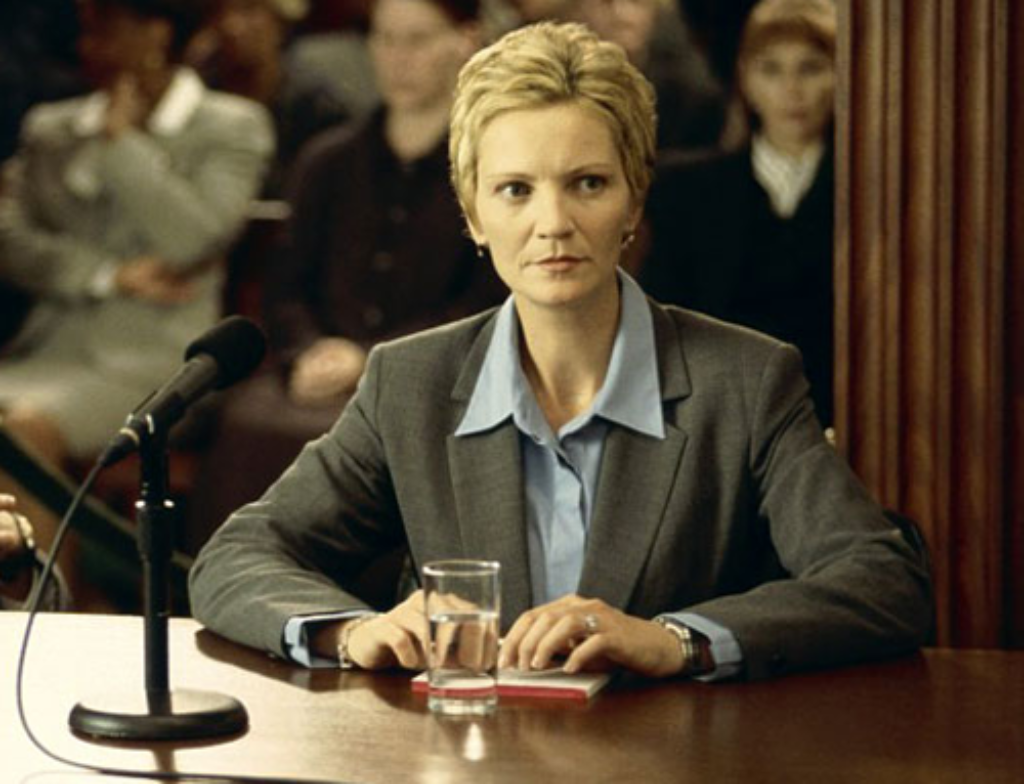
Intellectually compelling and thought-provoking, The Contender takes its place among such politically-charged films as The Candidate, All the President’s Men and The Parallax View. It’s gripping nature, however, may well be its gravest failing. It was reported that Gary Oldman (who plays a Republican Senator from Illinois) openly criticized his own film over editing cuts which he alleges were made due to the studio’s ultra-liberal leanings. According to ABC News’ online company Mr. Showbiz, Oldman’s manager, Douglas Urbanski told reporters that The Contender is little more than a “piece of propaganda” on par with that produced by Nazi propagandist Joseph Goebbels.
In The Contender, President Evans must select a new Vice President after his right-hand man dies. Evans’ selection, Senator Laine Hanson, must then be confirmed by Congress. Because the Senator is a woman, her confirmation is destined to be rockier than most. That’s where Oldman’s character, Shelly Runyon comes in. He chairs the confirmation committee, and he’s convinced that Hanson’s the wrong woman for the job. He unearths Laine’s scandalous past (there are photos of her participating in a sexual orgy) to rally voters (both those on the committee and the American people) against her. He succeeds. But an unexpected twist turns everything upside-down and paints Runyon as the vilest of political conspirators. The good guys (liberals) win and the bad guys (conservatives) go down in flames.
positive elements: The subtleties of The Contender are such that each “positive” element that arises is turned on its head by the closing credits. Savvy moviegoers can look past the sleight of hand, and extract positivity from between the lines, but it takes some doing. Moral failures do impact one’s life—political or otherwise—despite the fact that Laine devotes great quantities of time and energy trying to prove that they don’t.
spiritual content: When Laine’s young son tells his grandfather that in his kindergarten class he learned that Jesus made everything in the world, the older man is outraged that such “lies” are being told in public schools. It’s not surprising then, that Laine is a devout atheist and refers to Jesus as being equivalent to the tooth fairy. “I may be an atheist,” she tells the committee, “but I still go to church. My church is this very chapel of democracy.” Using violent imagery to make a political point, a man says that if you stabbed a man in the navel, it “wouldn’t matter if Jesus Himself healed the wound, the bastard would bleed to death.”
sexual content: Snapshots of the orgy are bandied about in several scenes, giving audiences brief glimpses of nudity and perverse sexual activity. Laine’s indiscretions are also talked about at some length, both in public (during the hearings and in the press) and in private (in the Oval Office one of the president’s top advisors, Kermit Newman, strings out crass comments about the incident). Audiences hear the sounds of Laine and her husband having sex right before they are interrupted by a call from the President. To defend her perceived right to have sex whenever and with whomever she pleases, Laine remarks, “One thing you don’t want is a woman with her finger on The Button who isn’t getting laid.” The President seems to agree. When confronted with Laine’s alleged sexual history, he says, “Married, unmarried, one guy, two guys, the whole football team, who the f— cares?” Love (and its sexual accompaniment) is deemed an “involuntary reflex” which Laine fell victim to.
violent content: A car crashes into a lake after running off the edge of a bridge. Jack Hathaway (who was passed over in favor of Hanson for the VP slot) dives in to save the driver. He fails and she dies, staring terrified and wide-eyed from inside the submerged vehicle.
crude or profane language: Fifty-some f- and s-words stream from the lips of the President, his aides, Senators and other political figures. Jesus’ name is abused about 10 times.
drug and alcohol content: Cigars and cigarettes take center stage several times, frequently in the mouth of the President. Evans brags that he’s been able to keep his habit secret from the press. Social drinking is also par for the course.
conclusion: Senator Hanson emerges from The Contender as an eloquent spokeswoman for the virtues of abortion rights and sexual laxity. Senator Runyon is vilified for his pro-life zeal and his attempts to link personal morality with an individual’s qualifications for public service. Indeed, it is in the arena of this “separation of private and public” that this film concentrates—and errs—the most. It concludes that nothing one does in private (past or present) affects one’s ability to serve as a political leader. That assumption, which was popularized by President Bill Clinton during his highly publicized sexual scandal in the White House, is elevated to the level of virtue here. (Note that Clinton’s name is even referenced on screen.)
For the record, one’s “private” life has everything to do with one’s character. And one’s character has everything to do with one’s qualifications for leadership. Laine does make good points about sexual inequality and double standards, but DreamWorks would have you believe that character is driven solely by achievement and accomplishment. It is not.
